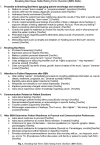Study protocol for a multicenter randomized controlled trial on simulation-based communication training for pediatric cardiology trainees (SIMUL-CHD)
- PMID: 39506730
- PMCID: PMC11539632
- DOI: 10.1186/s12909-024-06260-x
Study protocol for a multicenter randomized controlled trial on simulation-based communication training for pediatric cardiology trainees (SIMUL-CHD)
Abstract
Background: Effective physician-patient communication is crucial to compassionate healthcare, particularly when conveying life-altering diagnoses such as those associated with congenital heart diseases. Despite its importance, medical practitioners often face challenges in communicating effectively. Because of these gaps, we aim to introduce a simulation-based training protocol to improve pediatric cardiology trainee's communication skills. This study will be conducted in collaboration with associations supporting caregivers of children with congenital heart disease. It strives to demonstrate how specific training programs can efficiently foster humanistic, patient-centered care in standard medical practice.
Methods: This multicenter, open-label randomized controlled trial will be conducted in pediatric cardiac units and simulation centers of across 10 universities in France. The study population comprises pediatric cardiologists in training (including pediatric cardiac fellows or specialist assistants). The SIMUL-CHD intervention will consist of simulation-based training with standardized patients, focusing on improving communication skills for pediatric cardiology trainees during diagnostic counselling. Patients and caregivers have been recruited from a National Patient Association named "Petit Cœur de Beurre". The primary outcome is the quality of physicians' communication skills. The evaluation committee, which will review video recordings of the sessions, will be blinded to which participants received simulation-based training (group of interest) and which received theory-based training (control group). Secondary outcomes are the effect of SIMUL-CHD on empathy and anxiety levels in young pediatric cardiologists. Baseline scores pre and post-intervention will be compared, and skill improvement resulting from the intervention measured.
Discussion: Simulation-based training has proven efficacy in teaching technical skills in various scenarios however its application to communication skills in pediatric cardiology remains unexplored. The involvement of experienced parents provides a unique perspective, incorporating their profound understanding of the emotional challenges and specific hurdles faced by families dealing with congenital heart disease.
Trial registration: This trial is registered with the OSF registry (registered https://osf.io/ed78q ).
Keywords: Breaking bad news; Communication skills; Congenital heart disease; Empathy; Medical education; Patient-centered care; Pediatric cardiology; Physician-patient communication; Simulation-based training.
© 2024. The Author(s).
Conflict of interest statement
The authors declare no competing interests.
Figures



Similar articles
-
Teaching pediatric cardiology fellows to communicate serious news: a pilot study.BMC Med Educ. 2024 Oct 7;24(1):1092. doi: 10.1186/s12909-024-06078-7. BMC Med Educ. 2024. PMID: 39375650 Free PMC article.
-
Evidence Brief: The Quality of Care Provided by Advanced Practice Nurses [Internet].Washington (DC): Department of Veterans Affairs (US); 2014 Sep. Washington (DC): Department of Veterans Affairs (US); 2014 Sep. PMID: 27606392 Free Books & Documents. Review.
-
Simulation-based mastery learning compared to standard education for discussing diagnostic uncertainty with patients in the emergency department: a randomized controlled trial.BMC Med Educ. 2020 Feb 19;20(1):49. doi: 10.1186/s12909-020-1926-y. BMC Med Educ. 2020. PMID: 32070353 Free PMC article. Clinical Trial.
-
De-escalating Angry Caregivers: A Randomized Controlled Trial of a Novel Communication Curriculum for Pediatric Residents.Acad Pediatr. 2019 Apr;19(3):283-290. doi: 10.1016/j.acap.2018.10.005. Epub 2018 Oct 25. Acad Pediatr. 2019. PMID: 30368036 Clinical Trial.
-
Simulation-based training in cardiology: State-of-the-art review from the French Commission of Simulation Teaching (Commission d'enseignement par simulation-COMSI) of the French Society of Cardiology.Arch Cardiovasc Dis. 2021 Jan;114(1):73-84. doi: 10.1016/j.acvd.2020.10.004. Epub 2021 Jan 5. Arch Cardiovasc Dis. 2021. PMID: 33419690 Review.
References
-
- Abassi H, Huguet H, Picot MC, Vincenti M, Guillaumont S, Auer A, et al. Health-related quality of life in children with congenital heart disease aged 5 to 7 years: a multicentre controlled cross-sectional study. Health Qual Life Outcomes. nov 2020;12(1):366. 10.1186/s12955-020-01615-6 - PMC - PubMed
-
- Derridj N, Bonnet D, Calderon J, Amedro P, Bertille N, Lelong N, et al. Quality of life of children born with a congenital heart defect. J Pediatr Mai. 2022;244:148–e1535. - PubMed
-
- Amedro P, Dorka R, Moniotte S, Guillaumont S, Fraisse A, Kreitmann B, et al. Quality of life of children with congenital Heart diseases: a Multicenter controlled cross-sectional study. Pediatr Cardiol déc. 2015;36(8):1588–601. - PubMed
-
- Werner O, El Louali F, Fouilloux V, Amedro P, Ovaert C. Parental anxiety before invasive cardiac procedure in children with congenital heart disease: contributing factors and consequences. Congenit Heart Dis Sept. 2019;14(5):778–84. - PubMed
Publication types
MeSH terms
Grants and funding
LinkOut - more resources
Full Text Sources
Medical
Research Materials

